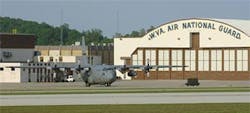Charleston, W.V.'s Yeager Airport Concerned Over Air Base Closing List
CHARLESTON, W.Va. (AP) -- Charleston's Yeager Airport sees no upside if a list to be released Friday recommends that the U.S. Defense Department close or relocate the West Virginia Air National Guard's 130th Airlift Wing.
''I don't see any silver lining,'' airport Director Rick Atkinson said.
West Virginia's congressional delegation, Gov. Joe Manchin and others have expressed concern this week that the 130th's base could be among the more than two dozen National Guard facilities nationwide expected to make this year's Base Realignment and Closure list.
The Pentagon is reviewing its 425 major U.S. domestic bases as well as smaller installations to save billions of dollars a year. Friday's list reflects recommendations to the nine-member BRAC Commission, which must issue a final report to President Bush by Sept. 8.
The 130th shares the same mountaintop airfield as Charleston's Yeager Airport. The base provides security for the airport's grounds and also shares its firefighting unit as part of its lease agreement with the airport.
Replacing those services would cost Yeager $1.2 million a year, while buying its own fire protection vehicles and gear would cost another $2 million, Atkinson said.
Since the airport has limited flat ground, Atkinson said Yeager could make little practical use of the hangers and other facilities occupied by the 130th.
''It's separated by an active runway, so you couldn't connect the terminals,'' Atkinson said.
Atkinson said Charleston may be hard-pressed to find alternative uses for the base. The city of Columbus, for instance, spends $3 million a year to subsidize a cargo and charter service at the former Rickenbacker Air Force Base, he said.
The 130th employs 320 full-time military and civilian staffers, while another 700 guardsmen are assigned to the unit. The base provides about $71 million to the local economy annually in goods, services and salaries, said Guard spokesman Maj. Mike Cadle.
The unit's C-130H turboprop cargo planes have become a fixture in Charleston, where crews routinely fly practice runs over the downtown and outlying areas. But defense analysts believe the Pentagon may be moving to transfer newer C-130H planes to active-duty units.
''We do know the active duty Air Force wants to modernize its fleet of C-130s so they don't have to buy a lot of C-130s,'' said Charles Smith, an associate with The PMA Group, a Washington-based consulting firm on defense and other issues.
Smith was the executive director of the 1995 BRAC Commission responsible for the prior round of base closings. He noted that some Air Guard stations targeted during that round saw its people and equipment transferred to other bases in some cases.
Smith also said the Air Force has been trying to free up funds for the new F-22 fighter, and so could target units with older aircraft. The 130th has already begun to inherit later-model C-130H planes from the 167th Airlift Wing in Martinsburg. The 167th is in the process of replacing its C-130 fleet with the Air Force's largest cargo jet, the C-5 Galaxy.
U.S. Sen. Robert C. Byrd, D-W.Va., met with Bush on Wednesday and delivered a letter signed by all five members of the state's congressional delegation urging the president ''to reject any list that recommends the closure or realignment of the 130th Airlift Wing at Yeager.''
The 130th ranks fifth among 89 Guard units in the nation for retention, and eighth for staffing. It has been named the Air Force's outstanding unit four times since the 1970s.
''That helps, but you must remember that the active duty Air Force is making these decisions, not the Guard,'' Smith said.
In less than 10 years, the military has closed 97 major bases and more than 200 minor bases and has realigned 145, with an estimated savings of nearly $17 billion through 2001. The last round of base closures was in 1995.
